Are you looking for home remedies for toothache pain relief? Dental pain is never fun to deal with, so it’s understandable you want to find the best thing for toothache pain relief fast. Fortunately, there are various toothache pain relievers you can try at home – both medicines and natural toothache home remedies.
In this article, you will find home remedies for abscess tooth pain and toothache so you can stop a toothache at home, including:
- Painkillers for toothache
- Severe toothache pain relief
- Topical treatments like toothache gels
- Natural remedies for toothache pain relief that you can make at home
Often the best cure for toothache is not a toothache home remedy, but a trip to the dentist, since underlying oral health problems like tooth decay or infection can’t be treated at home.
According to the Oral Health Foundation, home dental treatments can be a bad idea and should be avoided where possible.
If you need help to find a dentist, you can call 866-383-0748. You’ll be connected with a live operator 24/7 who can put you through to a dentist near you.
In This Article
The best painkillers for toothache in the US
If you keep a supply of regular toothache painkillers on hand, these are probably a good place to start when you need quick toothache pain relief at home.
Ibuprofen for tooth pain relief

Standard painkillers like acetaminophen and ibuprofen are toothache home remedies that can be enough to ease tooth pain, if not stop it altogether. Dental pain is often caused by swelling, in which case ibuprofen is the best painkiller for toothache because of its anti-inflammatory properties.
Look for these painkillers as the active ingredients in commonly used brands. Many people use Advil Liquid Gel for toothache because its active ingredient is ibuprofen, or Tylenol because its active ingredient is acetaminophen.
If taking one or the other of these tooth pain remedies isn’t effective, it’s safe for adults to take both, alternating them up to the maximum dose shown on each packet. For adults, this is 200-400mg of ibuprofen every 6-8 hours, up to a maximum of 1200mg every 24 hours, or 325-1000mg of acetaminophen every 4-6 hours, up to a maximum of 4000mg (eight 500mg tablets) in 24 hours.
However, you should only do this as a temporary measure while you await dental care. People who self-medicate as a home remedy for toothache may overdose, and taking too much Tylenol at one time may damage your liver.
If your child has a toothache, you can give them the appropriate dose of children’s acetaminophen or ibuprofen as a tooth pain remedy. You should also take them to the dentist as soon as possible. Make sure you get medical advice from a licensed professional before administering toothache home remedies to children. Click here for information on free and reduced-cost dental care for kids and read our full Medicaid, Medicare, and CHIP guide to find out more about state-funded insurance options.
Aspirin
This is another over-the-counter painkiller that fights inflammation and can offer considerable toothache pain relief. Aspirin is only suitable for adults over 18, and you must not take it if you are bleeding from your mouth (or anywhere else) since it prevents blood from clotting.
You may have heard that you can put aspirin directly on sore gums to ease toothache, but you should never do this as it can damage soft tissue in your mouth.
Naproxen
Taking naproxen for toothache can be effective because it works to reduce inflammation, which is often the cause of tooth pain. Naproxen is sold under the brand name Aleve, among others. You can get it on prescription from your dentist or buy it over-the-counter for toothache pain relief at home. It can be taken in conjunction with acetaminophen, but not ibuprofen. Naproxen can stop tooth pain for up to 12 hours, but it’s not suitable for asthmatic patients.
When tooth pain strikes, having an action plan in place can save you from lots of anxiety. The first thing you should do is call the dentist and schedule an appointment to be seen. If your tooth is showing signs of pain, it could signal that there is tooth decay inside the tooth.

However, cavities are not the only causes of toothaches, so the remedy for your dental pain might be quite simple. While you are waiting to be seen by your dentist, use a soft-bristled toothbrush to clean your teeth, as this will be gentler on the area that is sensitive. You should use a toothpaste specifically made for sensitivity as well.
It may seem obvious, but don’t chew on hard foods where you have a toothache. If tooth decay is causing your pain, this could cause the tooth to chip, crack, or break. In fact, if you have sharp pain while chewing or biting, it could be a sign that you already have a cracked tooth (or a cavity).
Dr. Angela Evanson, Angela Evanson DDS
Home remedies for severe toothache pain relief
Over-the-counter painkillers may not be enough in certain cases, for example, to stop pain resulting from a broken tooth – especially if the tooth nerve is exposed. Similarly, tooth abscess pain can be too intense for regular painkillers to have much effect. Also, there isn’t a tooth abscess home remedy, as this condition will need to be ultimately treated by a dentist. A painful wisdom tooth will also require professional attention.

You can combine these painkillers with any of the topical gels and natural remedies for toothache described below to help with severe toothache pain relief.
If taking painkillers doesn’t help your toothache, or if you have to keep taking them for several days to keep relieving your pain, it’s a sign you should see a dentist. An emergency dentist can prescribe much stronger painkillers than you can get over the counter, as well as antibiotics if you have an infection or tooth abscess.
Topical toothache gels and ointments
Another type of home remedy for toothache pain is topical medicine designed specifically to treat toothache and other oral pain. Here are some of the best toothache gels and gum pain relief products available in the US.
Orajel
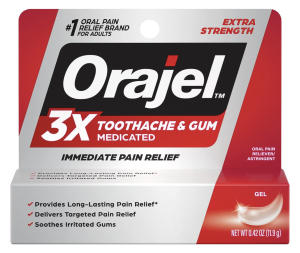
Orajel is one of the more popular over the counter toothache remedies on the market. It is made with 20% benzocaine, .26% menthol, and .15% zinc chloride for a maximum strength formula that provides instant relief. Another point in favor of Orajel is that it comes in an easy-access tube so you can get the relief you need right away.
How to use Orajel:
- Remove the cap and cut off the tube tip.
- Apply a small amount of gel onto your tooth or gum.
- Use up to 4 times daily.
How to apply Orajel
According to the manufacturers the instructions for applying Orajel are as follows:
- Remove the cap and cut the tip off the tube.
- Apply a small amount to the affected area.
- Use up to 4 times daily.
Orajel is meant for adults and children 12 years and older, and is not meant for continuous use.
Red Cross Toothache medicine
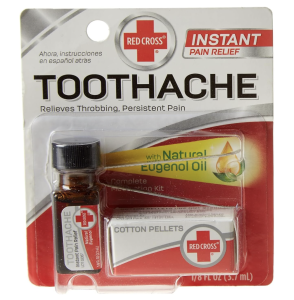
Red Cross Toothache is a severe toothache remedy that provides fast-acting relief and contains natural eugenol. This popular US toothache remedy is meant to relieve throbbing toothache caused by cavities until a dentist can see you.
Red Cross Toothache comes with cotton pellets that are soaked in the liquid and then applied to painful teeth.
Dentek
Dentek toothache kit is a liquid pain reliever and tooth-numbing gel that provides fast relief from severe toothaches. Its active ingredient is benzocaine, and it comes with easy-to-use applicators. They also make a tooth repair kit that can help if you lose a filling or a crown.
Natural remedies for toothache
There are various natural toothache pain relievers that can help soothe a toothache. Some of these have anti-inflammatory and antibacterial properties to help address the cause of the pain, too. We recommend caution when using any of these natural remedies for toothache, and it’s always a good idea to first check with your dentist.
How to use clove oil for toothache
If you’re looking for natural toothache pain relief, what’s probably known as the best remedy for toothache is clove oil. Clove oil contains eugenol, an ingredient with natural anesthetic and antibacterial properties that also help reduce inflammation, making it a go-to essential oil for toothache relief.
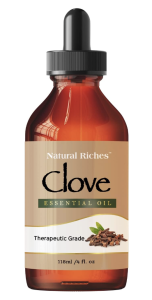
You can find clove oil for tooth pain in pharmacies and health food shops, or you can buy it here on Amazon.
To use clove as an essential oil for toothache, it’s best to dilute it first. Mix a few drops of clove oil with a teaspoon of olive, almond, or coconut oil. Alternatively, you can buy a pre-made clove oil blend like this one.
Dip a cotton ball into the oil and hold it against the painful tooth for a few minutes. Avoid eating or drinking anything straight afterward, and repeat every few hours if needed.
Clove oil is one of the most popular essential oils for toothache and can be an effective way to relieve toothache at home, but you should exercise caution when using any essential oils as a natural remedy for toothache especially for children. Do your research so you know how much to use and at what dilution.
There are certain cases when clove oil should not be used to stop a toothache:
- Infants or toddlers experiencing teething pain
- Pregnant or nursing mothers
- Anyone with a bleeding disorder, since clove oil can slow down blood clotting
-Renad S. Nahhas, Pharmacist
If you don’t have clove oil on hand, you can also use whole or ground cloves for toothache. Grind them (or use clove powder) and mix with oil to form a paste, then apply this to your mouth. It’s not as effective as using clove oil, but it should still help with toothache relief. Keep in mind that if you use clove oil for toothache, side effects may occur such as sensitivity and irritation of the gums.
Heat or cold?
If you’re wondering whether to apply something hot or cold for a toothache, the general consensus is that ice for toothache can help, as it reduces swelling and can slightly numb the pain, but heat should never be used, as it may cause the affected area to become more inflamed.
Saltwater
This easy toothache home remedy helps kill bacteria and reduce swelling in your mouth.
To use salt water for toothache, add a teaspoon of salt to a small glass of warm water and stir until dissolved. Rinse this around in your mouth for up to a minute, then spit out.
Tea bag
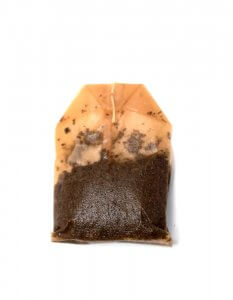
Another toothache home remedy is peppermint tea, which can help reduce swelling and pain. Brew with tea leaves or a tea bag and leave it to steep for 10-15 minutes before sipping and swishing it around in your mouth.
You can even use a regular black tea bag as a compress to ease toothache. Soak it in warm water then place it against the sore tooth for a few minutes. The astringent tannins in the tea might prove to be a short-term toothache remedy.
Garlic
Some people find garlic to be an effective home remedy for toothache, however, it has been known to cause skin burns – so try it at your own risk! To use garlic for tooth pain, you can mash a garlic clove into a paste and apply it to the painful tooth for 10-15 minutes.
Coconut oil
Coconut oil has antimicrobial properties, so it can naturally help fight tooth decay. Although it is not the most well-known option, it is safe in case of accidental swallowing, as coconut oil is used in cooking in many cultures around the world.
Baking soda
Baking soda neutralizes acidic solutions, and since bacteria thrive in acidic environments, it can help eliminate bacteria and reduce swelling around a toothache. To use, combine a small amount of toothpaste or warm water and baking soda and gently rub the paste directly on the affected tooth. This natural pain relief for toothache is, like the others, most likely not a home cure for toothache, but a way to temporarily stop the pain.
Apple cider vinegar toothache remedy
Apple cider vinegar is said to provide quick relief as a home remedy for bad toothaches as well. Take a look at the following video for more information on usage.
Essential oils for tooth pain
Essential oils are natural oils concentrated from plants and are used quite often as toothache home remedies. We’ve already mentioned the most popular, clove oil, but let’s take a look at some other essential oils for tooth pain and whether they are worth giving a try.
Tea tree oil
Tea tree oil for toothache is another go-to home treatment. It has microbial properties, so if your tooth pain is caused by bacteria, pairing it with your doctor-prescribed antibiotics may help as a toothache remedy. Tea tree oil for toothache should only be given to adults as it can be poisonous if swallowed.
Peppermint oil
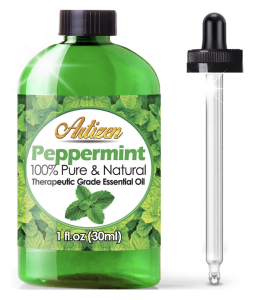
Another popular home remedy is to use peppermint oil for toothache. It has antimicrobial properties and will help to numb toothache pain.
Wondering how to use peppermint oil for toothache? Just apply three to four drops of the essential oil on the afflicted area.
Oregano oil
Oregano oil is a less common toothache home remedy that works very much like peppermint oil, as it also has numbing and antimicrobial properties.
Vanilla extract
We thought it worth mentioning vanilla extract for toothaches in this section, because, while not actually an essential oil, it has analgesic and antiseptic properties and is another popular toothache home remedy. One of those properties is eugenol, which is also what makes clove oil so effective. Vanilla extract will only provide temporary toothache pain relief, so it’s still important to seek professional help if pain persists.
Use caution when using any of these oils, as these toothache remedies don’t have as much researched-based evidence to prove that they will help with mouth pain as clove oil does.
Home remedies for toothache and tooth pain: Summary
The table below summarizes the most popular toothache pain relievers that we have mentioned, which you can use to treat tooth pain at home:
Remedy | Type | Benefits |
Ibuprofen | Painkiller | Pain relief, anti-inflammatory |
Acetaminophen | Painkiller | Pain relief |
Aspirin | Painkiller | Pain relief, anti-inflammatory |
Dentek | Liquid | Topical pain relief |
Red Cross | Liquid | Topical pain relief |
Clove oil | Natural remedy | Anesthetic and antibacterial |
Salt water rinse | Natural remedy | Antibacterial, anti-inflammatory |
Peppermint tea | Natural remedy | Pain relief, anti-inflammatory |
Coconut Oil | Natural remedy | Antibacterial, anti-inflammatory |
Baking soda | Natural remedy | Pain relief, anti-inflammatory |
Apple cider vinegar | Natural remedy | Antibacterial, anti-inflammatory |
Check out the following video for a look at various home remedies for toothaches, including some that we haven’t talked about like pressure point or acupressure for toothache, but please do your research before using a product or method at home that hasn’t been approved by your dentist.
What else helps a toothache?
Aside from the home remedies for toothache mentioned above, there are some other things you can do to minimize pain from sore teeth and gums while you wait for it to pass or seek treatment.
What to eat when your teeth hurt
Any extra pressure on the affected tooth or teeth is likely to make your toothache pain worse. If you have pain from a cracked tooth, biting down on it could cause the crack to deepen – and the more damage there is, the less likely it is that the tooth can be saved.
So, it will help stop the toothache from worsening if you stick to soft foods and try to avoid chewing on the side that hurts. Soft foods to eat when you have a painful tooth include:

- Smooth soups
- Fruit smoothies and purees (but avoid acidic fruits)
- Milkshakes
- Mashed potatos and other vegetables
- Scrambled eggs
- Yogurt
- Porridge
- Bananas
Very cold or hot food and drinks will likely aggravate your toothache pain, as will anything particularly spicy, sugary or acidic, so try to avoid these.
Other ways to relieve tooth pain at home
- Don’t smoke: This can aggravate certain dental problems.
- Elevate your head while sleeping: To get rid of toothache at night, use an extra pillow or two to keep your head elevated while you sleep. Lying flat increases the blood pressure in your head.
- Brush your teeth as normal: Unless there is damage to your tooth or gum, brush as normal to stop more harmful bacteria reaching your tooth.
- Ice pack: Although you shouldn’t place ice directly on the painful tooth, an ice pack or bag of frozen peas wrapped in a dishcloth and placed on your cheek is a convenient home remedy for tooth pain that can help reduce swelling and can help to numb pain.
How do you make a toothache go away for good?
We hope these home remedies for toothache show you how to stop a toothache fast at home. If you’re recovering from recent dental work or your toothache is linked to a cold, it should improve by itself.

However, if you’re unsure why your teeth are hurting (or you know why and you just don’t want to deal with it), we strongly recommend you visit your dentist. Dental pain can be a sign of a number of oral health problems including:
- Tooth decay
- An infection or tooth abscess
- A cracked or chipped tooth
- A broken or loose filling
- Bruxism (teeth grinding)
- An impacted wisdom tooth
In all of these cases, ignoring the problem is likely to make it worse in the long run. Even if you manage to stop your toothache with one of these home remedies for tooth pain, that doesn’t mean the underlying cause is fixed. Tooth decay, for example, can destroy the tooth nerve to the point you no longer feel pain. But the decay will keep spreading through the tooth root and may cause an abscess (which is even more painful), and there are no home remedies for tooth infection, because you’ll need to be prescribed antibiotics.
Additionally, if your pain is caused by the tooth nerve, there are really no permanent home remedies for tooth nerve pain. The things listed above can serve as temporary tooth nerve pain remedies, but you will most likely need to make an appointment for a filling or root canal.
It’s simple to find a dentist near you, available any time of day or night, by calling 866-383-0748. Alternatively, if you’d rather start by consulting with a dentist online, find out more about teledentistry, so you can assess the urgency of your problem without leaving home.
It’s better to seek treatment right away and avoid further damage which could require more drastic treatment like tooth extraction. You should also see a dentist if your dental pain lasts more than two days, or if you have a high temperature or any swelling.
Conclusion
When you are wondering what to do for a toothache at home, you should be able to get some relief from products you already have around the house. Painkillers, cloves and salt water can all help ease toothache pain, and you can also buy special toothache gels and ointments.
Ultimately, though, these home remedies for toothache should only be used temporarily. The best way to stop a toothache is usually to visit a dentist to treat the underlying cause. If you can’t get to a dentist, you may also want to make an online dentist appointment. Read more about teledentistry.
FAQs
How long does Orajel last?
Tooth and gum pain relief with Orajel toothache medication will typically last for a few hours, and you should start to feel relief in 10 to 15 minutes. Go to the dentist if it persists or gets worse.
How do I get rid of a toothache at night?
Sleep with your head in a slightly elevated position by using a couple of extra pillows. This will help relieve pain because there will be less blood pressure in your head. You can also use an over the counter pain medicine like Ibuprofen or Tylenol, or a topical gel like this red cross toothache medicine. If you want to avoid meds, you can also try a cold compress or applying a solution of clove oil diluted with olive oil.
How do I get rid of a toothache fast at home?
For fast toothache pain relief you can use an over-the-counter gel like the ones by Orajel or Red Cross. You can also try a solution of diluted peppermint or clove oil. If you’re sleeping, try to keep your head elevated.
What essential oil is good for toothache?
The two most popular essential oils used to treat toothache are clove oil and peppermint oil. Clove oil contains anesthetic and antibacterial properties, and peppermint oil has antimicrobial properties. Both help to reduce toothache pain.
What is the best over-the-counter medicine for toothache?
You can use ibuprofen for a toothache. Use acetaminophen if you have kidney disease, gastrointestinal problems, or are on a blood-thinner. Other options include gels like Orajel. These gels numb and soothe the affected area.
How long does a toothache last?
A toothache can last anywhere from an instant to until you get it treated at the dentist. Toothaches that last a few seconds are usually due to cold or hot sensitivity.
American Dental Association. Paying for Dental Care Consulted 11 March 2024
Clemson University. pH Values of Common Foods and Ingredients Consulted 12 March 2024
Sunstar. Global Healthy Thinking Report. Consulted April 12th 2024.
Mayoclinic.org: Acute liver failure. Consulted 6th February 2023.





